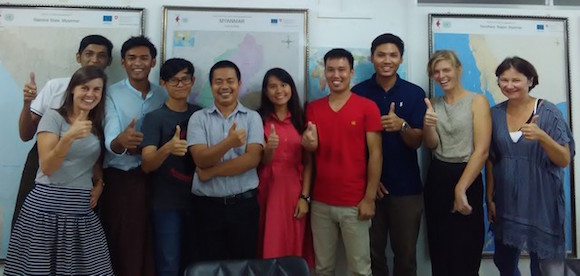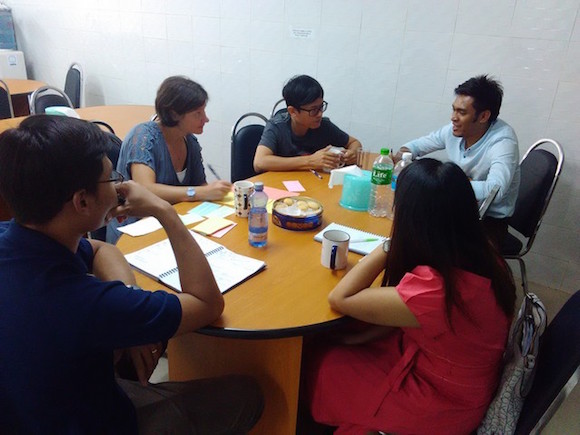 11th December 2016 maybe just another date on the calendar but it is one with a lot of significance to us. We were meeting in Yangon with a group of motivated young professionals from different stakeholder groups in agriculture (university, private sector, national and international CSOs, research centre) from Myanmar, to discuss - in a first formal workshop - the creation of the YPARD Myanmar unit.
11th December 2016 maybe just another date on the calendar but it is one with a lot of significance to us. We were meeting in Yangon with a group of motivated young professionals from different stakeholder groups in agriculture (university, private sector, national and international CSOs, research centre) from Myanmar, to discuss - in a first formal workshop - the creation of the YPARD Myanmar unit.
And as with every formal gathering, there are expectations attached to it. We asked the members present and here are some of the voiced expectations:
- Thein Soe Min, General Manager of Green Way, building mobile applications for farmers, wishes to meet with other active youth to develop agriculture in Myanmar.
- Thant Zin Maung, a graduate from Yezin Agriculture University (YAU) and currently working at the World Agroforestry Centre, wishes to see a lively network of youth in agriculture in Myanmar working together to improve agriculture sector.
- Aung Htun Oo, a YAU/Ghent PhD student in Agriculture Economics and YAU Alumni, wishes to become a member of YPARD to share and exchange knowledge and experience on climate change impact and rural development, to improve the sustainability of agriculture in Myanmar.
- Ye Min Thant, a young expert on water/agrofood and Programme Officer at ICCO Cooperation working on agricultural projects, thinks that agriculture is very important in Myanmar and platforms are needed even more to tap into Myanmar’s youth great energy and enthusiasm.
- Cho Zin Thet, who has a background in public policy and works as Economic Justice Policy Officer for Oxfam Myanmar, reckons that youth are not interested in agricultural job opportunities and as such, this presents an opportunity for YPARD to make agriculture attractive to youth again in Myanmar.
- Zaw Htet Aung, the Partnership Coordinator at Radanar Ayar Rural Development Association and working on agricultural projects, wants to see how YPARD can be a tool for climate smart agriculture in Myanmar.
- Thura Aung, the Executive Director at Radanar Ayar Rural Development Association wants to engage more young people in agriculture in Myanmar. Agriculture is a fundamental sector but the engagement of youth is weak. YPARD can help with capacity building of young people and knowledge management.
- Bente Meindertsma, the Country Coordinator of the AgriProFocus network in Myanmar focusing on agri-business for development, research, government, private sector and NGOs, wishes to have YPARD Myanmar help create an AgriProFocus youth working group in Myanmar.
- And us Marleen Brouwer and Alessandra Giuliani strongly motivated to support the creation of YPARD Myanmar. Marleen is a young expert on water/agrofood and Country Coordinator at ICCO Cooperation is an already active member of YPARD Netherlands, and has supported the creation of YPARD Myanmar from the beginning. And on the other hand, Alessandra works as a researcher at Bern University of Applied Sciences-HAFL and is a YPARD co-founder and senior advisor, based in Myanmar. She wants to help identify the needs and challenges of youth in agriculture in Myanmar, and support the establishment of YPARD Myanmar.
Challenges and needs of youth in agriculture in Myanmar we identified
These expectations in one way or another form the basis of the ‘why’ of YPARD Myanmar’s creation. Additionally, we identified a few factors that hinder youth engagement in Myanmar.
From an image level, agriculture is not an attractive venture to youth (neither farming nor agribusiness) because of its low productivity, low profitability, lack of facilities for farming and agri-processing. This is one of the reasons why parents discourage their children to stay or to enter agricultural sector. Lack of the necessary factors of production pose greater challenges for young people in Myanmar to join the sector. Youth have little or no access to land and the situation has been worsened by land grabbing problems. In addition, there is a lack of skills in modern agricultural practices among youth - and the extension system is weak - which results to youth having low level of decision power in the family farming. Lack of opportunities for youth to raise their voice on policy/governmental level (due to cultural and patriarchal system) also on issues where they are very much concerned (use of chemicals/GMOs for health and environmental sustainability) has greatly affected their entry into the sector.
However, not all is lost and the participants felt there are ways that the youth could be helped to join the sector. For instance, giving ownership to youth in agriculture, making them feel they are contributing to a major cause in their country like food production could lure them to the sector. Besides that, provision of vocational training on modernised farming systems to youth and mainstreaming youth in programs and projects, for example selection of young enumerators in research studies being involved and trained, could go a long way in improving the image of agriculture. It would also help involving and enabling youth to raise a voice in policy debates, such as the problematic importing of agrochemicals and GMOs, and lack of loans to smallholder farmers.
YPARD Myanmar target members and incentives to join
In a first phase, we will involve Young Professionals (YPs) in farmers’ organizations (FOs), research and academic organizations, private sector and civil society organizations (CSOs) while in the second stage young farmers will be contacted through FOs.
Some of the identified incentives for the members to join include: advocacy and networking, like public group to advocate in favour/against issues of concern from the perspective of YPs; inclusion of youth in agri federations; participation as YPARD in studies to provide facts and figures to support a campaign; participation in training and networking events; and exchange information with other YPs.
During the workshop, the group also made a mapping of organizations which represent youth in agriculture in Myanmar, and to which we can reach out to disseminate the message of YPARD Myanmar. This mapping included alumni, current students and lecturers at YAU, the University of Veterinary Sciences, the University of Forestry, the State Agricultural Institutes, FOs and CSOs networks, and the private sector.

Nomination of YPARD National Representative and working group
With the hosting organization as Radanar Ayar Rural Development Association, a working group of five very dedicated young professionals is already in place and ready to work towards a growing and well-functioning YPARD Myanmar unit. These are Aung Htun Oo (National Representative); Thein Soe Min; Thant Zin Maung; Cho Zin Thet; Zaw Htet Aung. Congratulations are in order to them all!
Pillars for plan of activities for 2017/2018
Based on the discussed challenges and needs, it was agreed that the first plan of activities for YPARD Myanmar will involve the following five pillars, where some ideas of activities have already been identified. The plan will be developed soon by the working group, to include a budget and a fundraising strategy. It will be also presented at the launch in 2017.
The policy and advocacy pillar will involve potential activities like youth campaigns to raise a voice for a better regulated import/use of agro-chemicals and GMOs as well as for more governmental support to smallholder farmers; YPs inputs into the Agriculture Development Strategy in January; including two youth representatives in Myanmar Rice Federation; and advocating with Union of Myanmar Federation of Chambers of Commerce and Industry (UMFCCI) Young Entrepreneur Association (up until 45 years old) to focus also on agriculture besides other sectors and industries in Myanmar.
The promotion of the agricultural sector in Myanmar pillar will involve activities like the organization of an event to officially launch YPARD Myanmar in first half of 2017, in Yangon and/or Yezin; the possible link to thanking day for (former) teachers once every (couple of) year(s); and fun edutainment activities like trivia night.
The connecting young professionals in agriculture in Myanmar pillar will involve potential activities like meeting/exchanges with the Regional Coordinator of YPARD Asia to be involved in regional activities; creation of a database of youth in agriculture in Myanmar; and having the youth group as part of Myanmar Agriculture Network and/or AgriProFocus.
The capacity building and knowledge management pillar will involve potential activities like participation in a YPARD Asia event and/or YPARD globally; essay contest; linking to new curriculum development project of Wageningen UR and the State Agricultural Institutes; and linking to future Myanmar-Netherlands agrofood challenge.
The research and development pillar will include activities similar to the CGIAR Drylands study on youth in Morocco.
We are looking forward to the activities and expansion of a vibrant YPARD Myanmar unit! Join us and interact with us via these channels: Email: This email address is being protected from spambots. You need JavaScript enabled to view it. and Google group: https://groups.google.com/forum/#!forum/ypard-myanmar